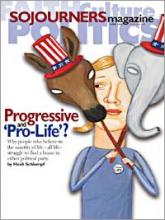What does it mean to be "pro-life"? For some, the term is understood very narrowly as the opposition to abortion, particularly through legal sanction. Others are committed to reducing the number of abortions, truly making them rare, but favor policies that don’t criminalize abortion—and prosecute women and/or their doctors—to do so. And as U.S. Catholic’s Heidi Schlumpf explains in this article, many people, on both sides of the legality question, see a genuinely pro-life stance as one that embraces respect for the human person at every stage—a position that’s hard to find in today’s polarized politics, and one that cries out for broad (and civil) dialogue across our various divides. —The Editors
It’s an election year, and once again Jennifer Roth is wondering if she might as well flip a coin. The 31-year-old systems administrator is one of those "swing voters" who could go either way—a demographic highly coveted by both Democrats and Republicans as the key to winning in 2004. But neither the Dems nor the GOP does much to inspire or excite Roth.
The problem? Roth is a self-described liberal on nearly all issues except one: Abortion. It’s a view that she—and countless other "pro-life progressives"—finds entirely consistent. "In my view liberalism is all about looking out for the little guy, the people who don’t have power, money, or protection," she says.
Read the Full Article

